- Home
- Michael McDowell
Jack and Susan in 1933 Page 5
Jack and Susan in 1933 Read online
Page 5
Jack looked at his father-in-law, who was staring at Susan as if wondering now what to make of her. Marcellus Rhinelander knew how to handle Communists, Socialists, and anarchists. A former variety artiste appearing now as the wife of his junior partner was an unknown animal.
Grace Grace appeared in the doorway with a bottle of champagne on a silver tray. Jack felt a wave of nausea build beneath his bandages—the fact that nausea had never before manifested itself in the region of his lungs made no difference whatever in its effect. The bottle of champagne reminded Jack of New Year’s morning, when he’d first met Susan Bright, and of what happened afterward. Perhaps his internal organs sensed some rope of circumstances that led directly from the bottles of champagne consumed in Harmon’s penthouse to the bandages that now constricted them. He felt sick to his stomach.
But he resisted the urge to bolt toward the bathroom when Marcellus Rhinelander popped the champagne cork, and it was with a sickly smile that Jack toasted the bride and groom. He felt a little better when it became apparent that Barbara had finished her bored little tirade against Susan. (And where had she picked up that information about Sue Sudan and Her Educated Sheepdogs ? Jack had never heard about that before.) Perhaps after the champagne, Harmon and Susan would simply drive back to the Quarry, and Barbara would corner her father and tell him five hundred stories about Harmon’s new wife, and Jack could return to the velvet jacket, the Recamier, and the fire in the bedroom hearth.
It was not to be.
Barbara invited Harmon and Susan to dinner, and Harmon blithely accepted.
Susan’s countenance didn’t sink. It brightened. “Oh, good,” she said, “that will give us time to renew our old acquaintance.”
“Old acquaintance?” echoed Barbara. “We’ve met only once. At Harmon’s. When he was so drunk. Of course, Harmon is always drunk, isn’t he? I’d be surprised if he wasn’t drunk at the wedding ceremony.”
Barbara implied that this was the only state in which Susan might have managed to persuade Harmon to the altar.
“Oh no,” said Susan, “that night I met you, I said to myself, ‘Barbara’s face is very familiar.’ And I thought and thought, and finally I realized that we’d known each other in college.”
“You went to Radcliffe?” asked Marcellus Rhinelander, startling pleasantly.
“Yes, of course,” said Susan with becoming modesty, “as did my mother.”
“I did not know you,” said Barbara, frowning. “I know I did not know you.”
“It was the most droll and amusing thing, really,” said Susan, lapsing into a manner of speech that was, Jack had to admit, a droll and amusing parody of his wife’s voice. “Did you ever know,” said Susan to Jack, “that your wife had been arrested?”
Barbara gasped. Jack spilled champagne down the front of his boiled shirt. Marcellus Rhinelander glanced at his daughter and then wandered back over to the sideboard.
“Arrested for what?” Harmon demanded with a grin.
“Nothing!” cried Barbara. “It was nothing! A college prank!”
“It was assault and battery,” said Susan with a gay laugh. “This was when? Oh ’twenty-six or ’twenty-seven—and there was the first talk of repealing Prohibition. And the bishop of Boston—the Episcopal bishop, I mean, of course—had just come out with a stirring statement in favor of sobriety and against repeal. Upset all his parishioners greatly, I can tell you.”
Barbara got up and walked over to Jack, holding her glass out to be refilled. “Shut her up,” she said quietly.
“You deserve this one,” Jack said as he poured his wife’s champagne, and then passed on to Harmon, who listened with unqualified delight.
“Get to the assault and battery part,” he urged. “Marcellus, did you know Barbara had been arrested in Boston?”
“No,” said Marcellus, “I did not.”
“Thank you,” said Susan as Jack refilled her glass. “So,” Susan went on with her story, and with her aping of Barbara’s mannerisms, “on Easter morning, Barbara and one of her chums—Jean Schmidlapp, I believe it was, wasn’t it, Barbara?”
Barbara nodded dourly.
“Barbara and Jean hid in the shrubbery outside the church, and when the service was over, and the bishop of Boston came out with the vice-president, who happened to be in town that week, Barbara and Jean pelted them both with champagne corks.”
“Champagne corks?” echoed Jack.
“Hundreds of them,” said Susan. “Such a gay escapade!” She laughed gaily again. “But, of course, as it was the bishop of Boston and the vice-president of the United States who were attacked, Barbara and Jean were bundled away to the police station.”
“How did we know it was the vice-president? Nobody knew what he looked like.”
“But how were you involved in all this?” Harmon asked his wife.
“Oh,” said Susan as if she’d forgotten this one small detail, “the bishop of Boston was my uncle, and the vice-president was staying with us at the time.”
Barbara stared. “You are a Boston Bright.”
“If you knew I was Sue Sudan, you ought to have known that,” returned Susan amiably. “Well, I recognized Barbara and Jean right off, though I must say that they were both wearing the most unbecoming frocks, left over from the night before, I imagine, and in none the best condition from their having hidden themselves in the shrubbery for an hour or so, but at any rate, having recognized them, I pleaded their case to my uncle and the vice-president, and then my mother provided bail, and my uncle on my mother’s side, who’s a judge on the Massachusetts Supreme Court, saw to it that the charges were dismissed. So you see,” said Susan, turning a bright smile on the dumbstruck Barbara, “if it hadn’t been for me, you would have gone to trial for assaulting the second-highest leader in the country—and almost certainly would have been thrown out of Radcliffe.”
“I didn’t know any of this,” said Barbara, shifting uncomfortably in her chair. “I didn’t know anything except that we were let go.”
“Oh, it wasn’t at all important,” said Susan with the blandest of bland, dangerous smiles for Barbara. “So long as you learned your lesson: not to attack indiscriminately.”
CHAPTER SIX
“WHY DID YOU marry her?” Marcellus Rhinelander bluntly asked Harmon Dodge when the gentlemen had adjourned to the study after a dinner of embalmed chicken and pineapple surprise. He poured brandies for Harmon and Jack, and passed around a cigar case.
“Perfectly obvious,” said Harmon. His words were clear, but when he was drunk, Jack knew, he never spoke in complete sentences. “Obvious why I married her. Question is. Why she married me.” Harmon fumbled with his cigar cutter and nearly amputated the last joint of the finger on which he now wore a simple gold band.
“Oh ho ho,” laughed Marcellus without mirth, “Mrs. Susan Bright Dodge doesn’t much look as if rayon stockings and a third-floor back much appealed to her. She’d much rather be in the orchid class and have three or four addresses, I’m sure.”
“Thought you. Liked her. Very polite and all that. Seemed as if you. Dinner tonight, I mean. Liked her very much.”
“I did,” returned Marcellus easily. “I admire beautiful young women exceedingly. It is very easy to be pleasant to them. But I tend to agree with Barbara’s judgment—she’s a counter jumper. She’s the kind of girl you meet in the linen department.”
“She is a Boston Bright,” Jack pointed out.
“Ah, but they crashed very hard. Such falls crack the finish. Then that sort of girl becomes worse than the ones that were born to be behind the counter.”
Jack thought that his father-in-law’s patronistic opinions had rather hardened since he’d employed the Communist chauffeur.
“Certainly put. The Indian sign. On me,” said Harmon with some degree of effort. “And believe me,” he added with a lurid grin, “it’s not so worse.”
Jack didn’t like that lurid grin. Even if a man’s wife was a gold digger, she didn’t
deserve to be talked about in that way, in a study filled with drunken men and tobacco smoke.
The doors of the study were flung open, and Barbara marched in. For this little impromptu supper Barbara had worn a full-length Chinese-yellow gown of crushed velvet with extra-long sleeves gathered at the cuff. In the point of accompanying jewelry, Barbara looked as if she’d just made a jump through one of Tiffany’s shop windows. Susan’s extremely tailored gray silk frock with pointed shoulders and narrow sleeves made her look slim to the point of fragility. Even in the flattering dining room candlelight, Barbara had looked as fragile as a man-of-war. If Barbara had been attempting to upstage Susan, she was as successful as she had been in revealing Susan’s history with educated sheepdogs.
“Susan thinks it time she and Harmon were getting home,” Barbara announced. “Susan reminds us that she and Harmon are only this afternoon returned from Niagara Falls. Isn’t that a charming conceit? A honeymoon in Niagara Falls? I thought only shopgirls did that. Harmon, you and Susan must have had a splendid, riotous time pretending to be a Brooklyn shopgirl and her brand-new twenty-dollar-a-week husband. Were the Falls truly splendid, Harmon, or did Susan’s beauty blind you to all else?”
“Blinded me. All else.”
“Harmon,” said Susan quietly. “Shall we go?”
“No,” said Harmon, holding out his brandy glass for a refill. Marcellus was already there with the decanter.
Susan sat down on a chair near the door. She refused a brandy.
Barbara flounced around the room.
Harmon looked at his new wife over the rim of his glass. “No,” he said with a repetition of the lurid grin, “let’s go. I’m tired. I want to go to bed.”
Susan stood immediately.
“Don’t rush off,” said Barbara expansively.
“Must,” said Harmon, staggering toward the door.
“Don’t drive,” said Jack quietly to Harmon. “You’re in no condition.”
“No,” agreed Susan as Harmon slipped on the edge of the rug and pitched forward into his wife’s arms, “you’re not.”
“Am,” said Harmon.
Barbara laughed gaily. “Same old Harmon. Marriage hasn’t changed you a bit. Still getting drunk every night and falling into the nearest pair of arms.”
“Susan,” said Marcellus, “you’ll drive, won’t you?”
“I never learned how,” said Susan, trying to prop her husband against the door lintel.
“Couldn’t afford lessons, I suppose,” said Barbara sympathetically, “or an auto to take them in. Oh, the exigencies of poverty! How they depress me!”
“Actually, we had five autos and two chauffeurs,” said Susan, pulling Harmon’s handkerchief from his pocket and wiping a drool of expensive brandy from his chin. “It’s just that my mother felt that driving was a vulgar occupation for a lady.” She smiled sympathetically at Barbara. “Harmon says that you were wrecking cars before he was.”
“Jack,” said Barbara, “take them home please. Susan looks very tired. Around the eyes, particularly. In fact,” she added to Susan in a confidential tone that Grace could hear in the kitchen through three rooms and two closed doors, “your entire body seems in the last stages of droop.”
“It has been a trying evening,” Susan admitted. “Something seems to have gotten to my head tonight. Either that foul, damp wind off the river or else that perfume you’re wearing tonight. It’s Miracle, isn’t it? Winnie Ruth Judd the ax-murderess wore it to the electric chair, and I’m told it positively steamed off her head when they pulled the switch. And yes, Jack, I’d be much obliged if you’d drive Harmon and me home.”
Jack glanced warily at his wife to see if she was about to load another bronze-jacketed insult into that gun she called a mouth. But Barbara was silent and only gave a little nod, which was Jack’s permission to drag Harmon Dodge out into the frigid night air.
The frigid night air acted as a very large fist to Harmon Dodge’s gut, and an indistinguishable mass of brandy, pineapple surprise, embalmed chicken, and champagne churned up over his tie, the gravel of the driveway, the passenger window of the roadster, and Jack’s slippered feet. Susan crawled into the backseat from the other side.
The car seemed colder than the night itself, for there is nothing colder than stiff frozen leather at your back. The driveway was dark. The narrow little unpaved road that led from the Cliffs to the Quarry was darker still, overhung with the branches of century-old evergreens. The sign marking the turn to Harmon Dodge’s ancestral home (ancestral indicating that it had belonged to Harmon’s father for the last six weeks of the old man’s life, though he never actually lived in it) had been knocked over by the Communist insurgent who had tried to visit Marcellus Rhinelander’s chauffeur earlier that day. Jack drove half an hour trying to find the turnoff. He peered over the steering wheel and wiped away the fog of his breath which instantly turned to patterned ice on the windshield. Harmon snored in the seat next to him, and periodically had to be pushed upright so that he did not fall over into Jack’s lap. Susan’s teeth chattered in the back.
“Where’s the damned turnoff?” demanded Jack.
“You know this place better than I,” Susan pointed out. “I was there only once, this afternoon.”
“There used to be a sign,” said Jack. “And this car reeks to high heaven.”
He waited for Susan to say “But it still smells better than your wife’s perfume.”
But she didn’t. Instead, she said, “I’d like to apologize for my behavior. It was wrong of me to insult Barbara in her own home.”
“It’s her father’s home, actually,” said Jack.
“Nevertheless, it was very wrong of me. But I was very tired, and also, I suppose, I felt as if I needed to stand up a little for Harmon’s sake. I didn’t want Mr. Rhinelander to think that his law partner had married someone who had been—merely—a speakeasy chanteuse. Because I will be a good wife to Harmon, you know.”
Jack glanced over at his superior, snoring through an open mouth.
“He could use one,” Jack admitted. “And—ah—don’t worry about Barbara. She’s been looking for an equal adversary for a while.”
“I have no intention of maintaining constant warfare against your wife.”
“Which means you don’t intend on seeing us anymore?”
Susan laughed, a gay, pleasant little laugh. Jack tilted his head a little so that he could catch a glimpse of Susan in the rearview mirror. Susan smiled. Jack smiled back. The roadster ran into a ditch. Harmon pitched forward, cracking his head on the windshield.
“Sorry,” said Jack, opening the door. He started to get out.
Susan screamed, “No!”
Jack put one foot outside the door, but it didn’t touch ground. It just pushed right on down through the air. The air was very cold, but sweat came out on Jack’s high noble brow as if the sun had been beating straight down upon it for hours. He carefully pulled his foot back in and then peered out the open door into blackness.
“It’s not a ditch,” Susan said, pushing well over against the opposite side of the roadster. “It’s evidently some sort of cliff.” Quickly, she kicked off her shoes, tossed aside her hat, and crawled out the window.
Jack sat still in his seat, drawing the door carefully closed. The car was tilted forward and toward the left. Jack surmised that the left wheel had gone over the edge of some precipice.
“I can see the river!” Susan shouted from outside the car and somewhere behind. “It’s about two hundred feet directly below us.” She pulled open the passenger door, and her husband fell out upon the ground.
Inside, Jack felt the car tilt distinctly forward and to the left. The windshield was fogged, but there was nothing outside to see except the two-hundred-foot drop to the Hudson.
Outside, Susan dragged her husband in a direction that was apparently away from the cliff.
“Ah,” said Jack diffidently, “can you tell anything more about our situation?”
Susan leaned in the open passenger door. “The car is about to plunge over the cliff, so far as I can make out.” She gave Jack a hand, and with a tug that showed more strength than he would have surmised resided in her small and elegant frame, Susan pulled him across the drive stick and nearly out the door.
“Thank you,” he said.
“You’re not free yet,” said Susan, and as if to prove the truth of her assertion, the car began to roll forward. Jack had unwisely dragged the gears into neutral.
Susan jerked him to safety just as the roadster plunged over the cliff.
Jack’s feet dangled in cold, insubstantial air. A few seconds later there was a crash, a noise like that of a small iceberg breaking free of a glacier, and then a rude gurgling.
“That roadster was worth twelve hundred dollars,” said Susan, dragging Jack from the lip of the cliff and certain death.
“It didn’t cost Harmon a penny,” Jack pointed out. His trousers had evidently been torn badly, for he could feel cold stones rasping into his flesh. “I have two broken ribs,” he said with sudden remembrance. With that remembrance, pain flooded back into that badly bruised area between his neck and his abdomen. He began to wish that he had been inside the roadster when it broke through the frozen waters of this fashionable length of the Hudson River. The novel sensation of drowning in freezing water might have taken his mind off the entirely too familiar discomfort he felt now in his unmended rib cage.
“If you have two broken ribs, then you ought not be driving,” said Susan. Harmon was still fast asleep, still snoring on the cold ground. “In particular, you ought not be driving off cliffs,” she added with undisguised annoyance in her voice.
Part II
SUSAN
CHAPTER SEVEN
IT WAS COLD. She was sweating, and despite the salt in her perspiration, it froze like tears in a cheap romantic print.
It was dark. Clouds covered the stars and the moon. She could see a single light burning in a house, but that house was maybe a couple of miles away on the other side of the Hudson River.

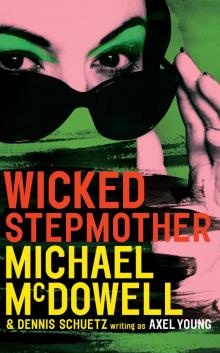 Wicked Stepmother
Wicked Stepmother Blackwater: The Complete Caskey Family Saga
Blackwater: The Complete Caskey Family Saga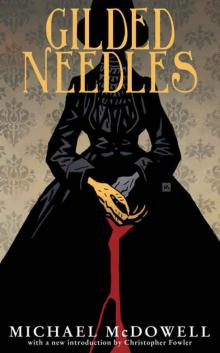 Gilded Needles (Valancourt 20th Century Classics)
Gilded Needles (Valancourt 20th Century Classics)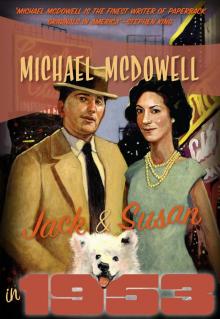 Jack and Susan in 1953
Jack and Susan in 1953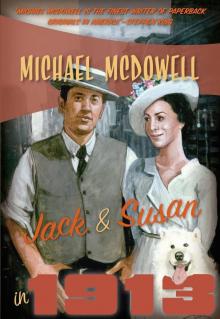 Jack and Susan in 1913
Jack and Susan in 1913 Rain
Rain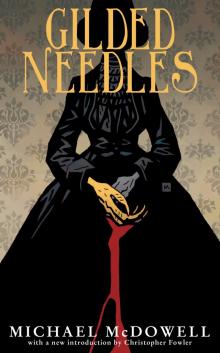 Gilded Needles
Gilded Needles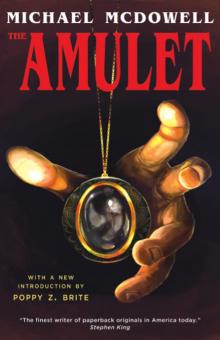 The Amulet
The Amulet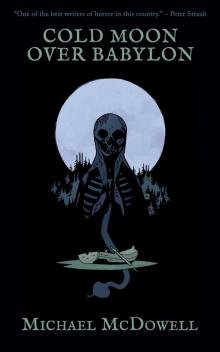 Cold moon over Babylon
Cold moon over Babylon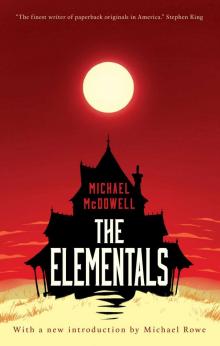 The Elementals
The Elementals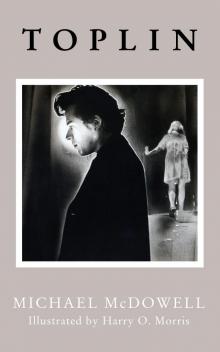 Toplin
Toplin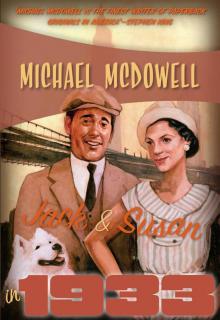 Jack and Susan in 1933
Jack and Susan in 1933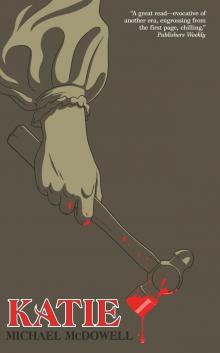 Katie
Katie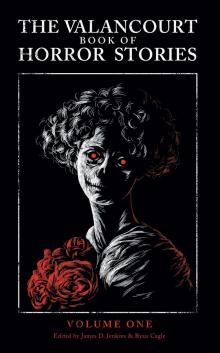 The Valancourt Book of Horror Stories
The Valancourt Book of Horror Stories